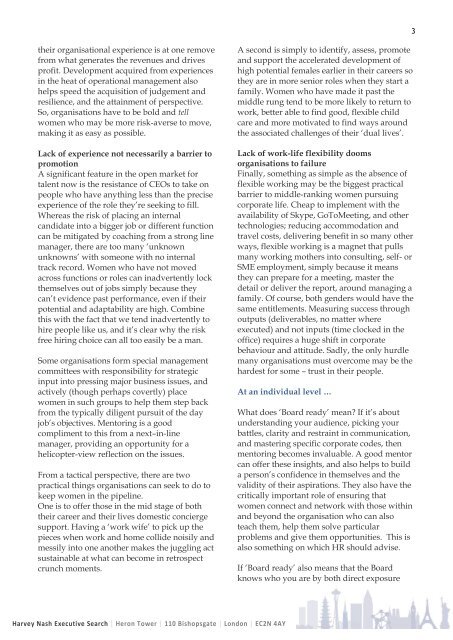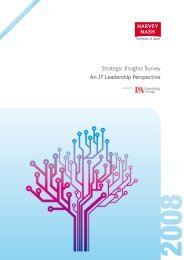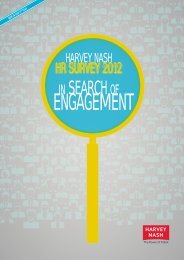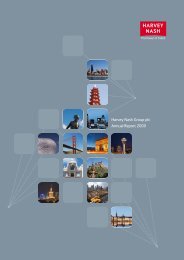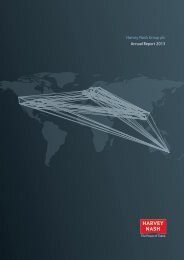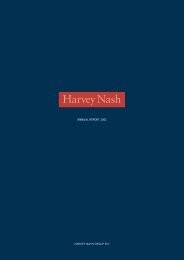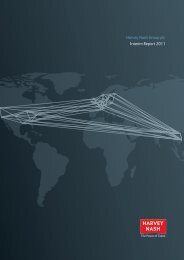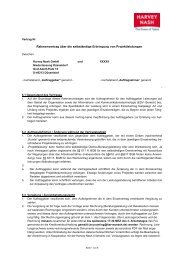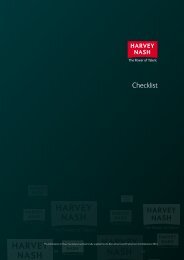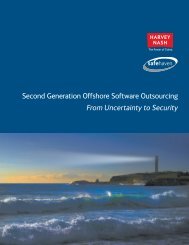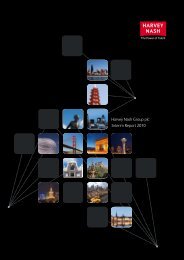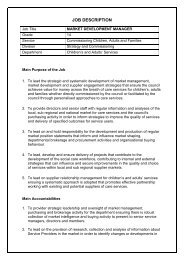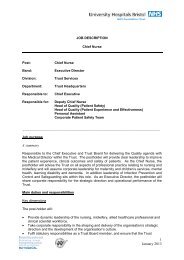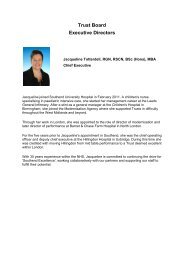Read the Harvey Nash Leadership Services Whitepaper here.
Read the Harvey Nash Leadership Services Whitepaper here.
Read the Harvey Nash Leadership Services Whitepaper here.
You also want an ePaper? Increase the reach of your titles
YUMPU automatically turns print PDFs into web optimized ePapers that Google loves.
3<strong>the</strong>ir organisational experience is at one removefrom what generates <strong>the</strong> revenues and drivesprofit. Development acquired from experiencesin <strong>the</strong> heat of operational management alsohelps speed <strong>the</strong> acquisition of judgement andresilience, and <strong>the</strong> attainment of perspective.So, organisations have to be bold and tellwomen who may be more risk-averse to move,making it as easy as possible.Lack of experience not necessarily a barrier topromotionA significant feature in <strong>the</strong> open market fortalent now is <strong>the</strong> resistance of CEOs to take onpeople who have anything less than <strong>the</strong> preciseexperience of <strong>the</strong> role <strong>the</strong>y’re seeking to fill.W<strong>here</strong>as <strong>the</strong> risk of placing an internalcandidate into a bigger job or different functioncan be mitigated by coaching from a strong linemanager, <strong>the</strong>re are too many ‘unknownunknowns’ with someone with no internaltrack record. Women who have not movedacross functions or roles can inadvertently lock<strong>the</strong>mselves out of jobs simply because <strong>the</strong>ycan’t evidence past performance, even if <strong>the</strong>irpotential and adaptability are high. Combinethis with <strong>the</strong> fact that we tend inadvertently tohire people like us, and it’s clear why <strong>the</strong> riskfree hiring choice can all too easily be a man.Some organisations form special managementcommittees with responsibility for strategicinput into pressing major business issues, andactively (though perhaps covertly) placewomen in such groups to help <strong>the</strong>m step backfrom <strong>the</strong> typically diligent pursuit of <strong>the</strong> dayjob’s objectives. Mentoring is a goodcompliment to this from a next–in-linemanager, providing an opportunity for ahelicopter-view reflection on <strong>the</strong> issues.From a tactical perspective, <strong>the</strong>re are twopractical things organisations can seek to do tokeep women in <strong>the</strong> pipeline.One is to offer those in <strong>the</strong> mid stage of both<strong>the</strong>ir career and <strong>the</strong>ir lives domestic conciergesupport. Having a ‘work wife’ to pick up <strong>the</strong>pieces when work and home collide noisily andmessily into one ano<strong>the</strong>r makes <strong>the</strong> juggling actsustainable at what can become in retrospectcrunch moments.A second is simply to identify, assess, promoteand support <strong>the</strong> accelerated development ofhigh potential females earlier in <strong>the</strong>ir careers so<strong>the</strong>y are in more senior roles when <strong>the</strong>y start afamily. Women who have made it past <strong>the</strong>middle rung tend to be more likely to return towork, better able to find good, flexible childcare and more motivated to find ways around<strong>the</strong> associated challenges of <strong>the</strong>ir ‘dual lives’.Lack of work-life flexibility doomsorganisations to failureFinally, something as simple as <strong>the</strong> absence offlexible working may be <strong>the</strong> biggest practicalbarrier to middle-ranking women pursuingcorporate life. Cheap to implement with <strong>the</strong>availability of Skype, GoToMeeting, and o<strong>the</strong>rtechnologies; reducing accommodation andtravel costs, delivering benefit in so many o<strong>the</strong>rways, flexible working is a magnet that pullsmany working mo<strong>the</strong>rs into consulting, self- orSME employment, simply because it means<strong>the</strong>y can prepare for a meeting, master <strong>the</strong>detail or deliver <strong>the</strong> report, around managing afamily. Of course, both genders would have <strong>the</strong>same entitlements. Measuring success throughoutputs (deliverables, no matter w<strong>here</strong>executed) and not inputs (time clocked in <strong>the</strong>office) requires a huge shift in corporatebehaviour and attitude. Sadly, <strong>the</strong> only hurdlemany organisations must overcome may be <strong>the</strong>hardest for some – trust in <strong>the</strong>ir people.At an individual level …What does ‘Board ready’ mean? If it’s aboutunderstanding your audience, picking yourbattles, clarity and restraint in communication,and mastering specific corporate codes, <strong>the</strong>nmentoring becomes invaluable. A good mentorcan offer <strong>the</strong>se insights, and also helps to builda person’s confidence in <strong>the</strong>mselves and <strong>the</strong>validity of <strong>the</strong>ir aspirations. They also have <strong>the</strong>critically important role of ensuring thatwomen connect and network with those withinand beyond <strong>the</strong> organisation who can alsoteach <strong>the</strong>m, help <strong>the</strong>m solve particularproblems and give <strong>the</strong>m opportunities. This isalso something on which HR should advise.If ‘Board ready’ also means that <strong>the</strong> Boardknows who you are by both direct exposure


